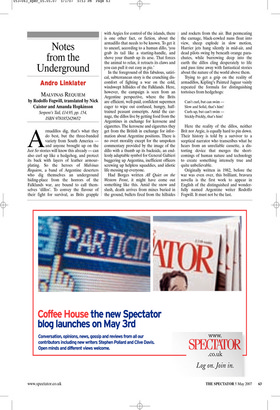Notes from the Underground
Andro Linklater
MALVINAS REQUIEM by Rodolfo Fogwill, translated by Nick Caistor and Amanda Hopkinson Serpent’s Tail, £14.95, pp. 154, ISBN 9781852429652 Armadillos dig, that’s what they do best, but the three-banded variety from South America and anyone brought up on the Just So stories will know this already — can also curl up like a hedgehog, and protect its back with layers of leather armourplating. So the heroes of Malvinas Requiem, a band of Argentine deserters who dig themselves an underground hiding-place from the horrors of the Falklands war, are bound to call themselves ‘dillos’. To convey the flavour of their fight for survival, as Brits grapple with Argies for control of the islands, there is one other fact, or fiction, about the armadillo that needs to be known. To get it to uncurl, according to a human dillo, ‘you grab its tail like a starting-handle, and shove your thumb up its arse. That forces the animal to relax, it retracts its claws and you can pull it out easy as pie.’ In the foreground of this fabulous, satirical, subterranean story is the crunching discomfort of fighting a war on the cold, windswept hillsides of the Falklands. Here, however, the campaign is seen from an Argentine perspective, where the Brits are efficient, well-paid, confident supermen eager to wipe out confused, hungry, halftrained peasant conscripts. Amid the carnage, the dillos live by getting food from the Argentines in exchange for kerosene and cigarettes. The kerosene and cigarettes they get from the British in exchange for information about Argentine positions. There is no overt morality except for the unspoken commentary provided by the image of the dillo with a thumb up its backside, an endlessly adaptable symbol for General Galtieri buggering up Argentina, inefficient officers screwing up helpless squaddies, and idiotic life messing up everyone.
Had Borges written All Quiet on the Western Front, it might have come out something like this. Amid the snow and slush, death arrives from mines buried in the ground, bullets fired from the hillsides and rockets from the air. But permeating the carnage, black-cowled nuns float into view, sheep explode in slow motion, Harrier jets hang silently in mid-air, and dead pilots swing by beneath orange parachutes, while burrowing deep into the earth the dillos cling desperately to life and pass time away with fantastical stories about the nature of the world above them.
Trying to get a grip on the reality of armadillos, Kipling’s Painted Jaguar vainly repeated the formula for distinguishing tortoises from hedgehogs:
Can’t curl, but can swim — Slow and Solid, that’s him! Curls up, but can’t swim — Stickly-Prickly, that’s him!
Here the reality of the dillos, neither Brit nor Argie, is equally hard to pin down. Their history is told by a survivor to a sceptical narrator who transcribes what he hears from an unreliable cassette, a distorting device that merges the shortcomings of human nature and technology to create something intensely true and quite unbelievable.
Originally written in 1982, before the war was even over, this brilliant, bravura novella is the first work to appear in English of the distinguished and wonderfully named Argentine writer Rodolfo Fogwill. It must not be the last.


































































































 Previous page
Previous page